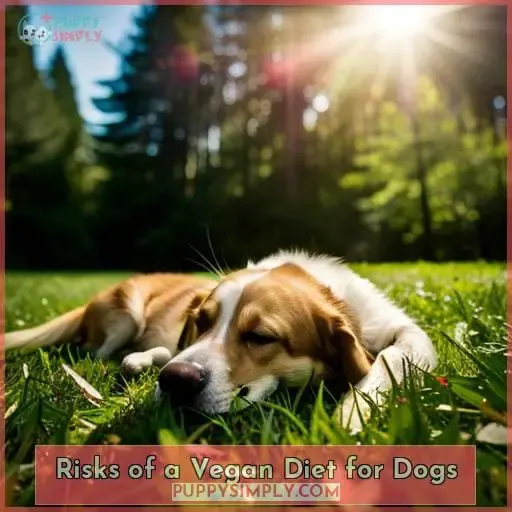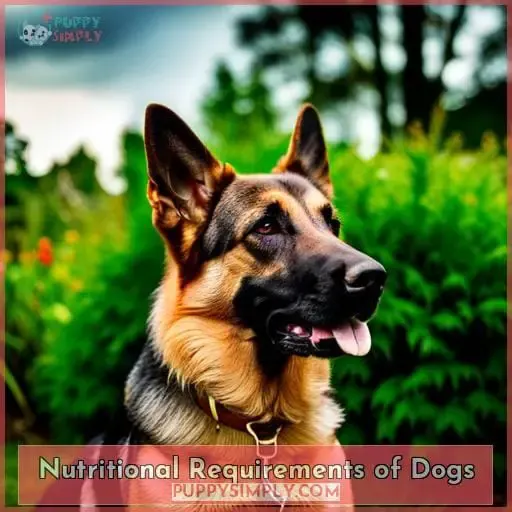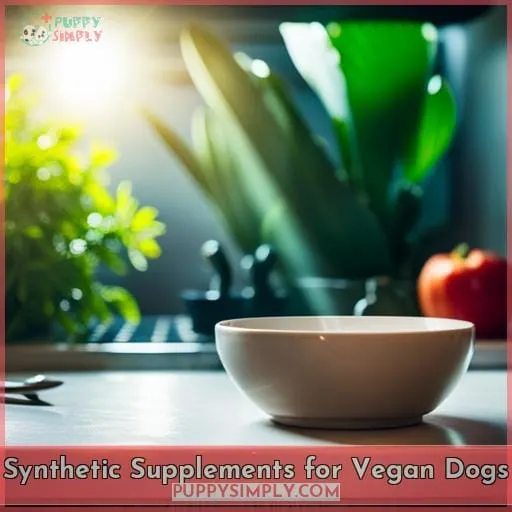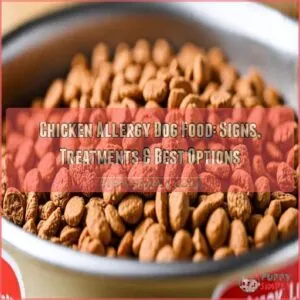This site is supported by our readers. We may earn a commission, at no cost to you, if you purchase through links.
 Imagine if your dog could follow a vegan diet, just like you. It’s an intriguing idea that has gained popularity in recent years. But before making any changes to your furry friend’s meal plan, it’s essential to understand the risks, nutritional requirements, and guidance involved in feeding dogs a vegan diet.
Imagine if your dog could follow a vegan diet, just like you. It’s an intriguing idea that has gained popularity in recent years. But before making any changes to your furry friend’s meal plan, it’s essential to understand the risks, nutritional requirements, and guidance involved in feeding dogs a vegan diet.
In this article, we’ll explore the potential challenges of a meat-free lifestyle for dogs and provide evidence-based information to help you make informed decisions about your pet’s dietary choices.
Table Of Contents
- Key Takeaways
- Risks of a Vegan Diet for Dogs
- Nutritional Requirements of Dogs
- Synthetic Supplements for Vegan Dogs
- The Sustainability Debate
- Providing Guidance for Vegan Pet Owners
- Frequently Asked Questions (FAQs)
- Are there any risks or potential health complications associated with feeding dogs a vegan diet?
- What are the essential nutritional requirements for dogs, and can a vegan diet meet these requirements?
- Are synthetic supplements necessary for dogs on a vegan diet, and if so, what specific supplements should be provided?
- What is the sustainability debate surrounding vegan diets for dogs, and how does it affect pet owners?
- Is there any guidance available for pet owners who want to feed their dogs a vegan diet, including tips on meal planning and ingredient selection?
- Conclusion
Key Takeaways
- Insufficient protein intake and imbalances of essential amino acids are potential risks of vegan diets for dogs.
- Veterinary guidance is important when considering a vegan diet for dogs and ensuring proper nutrition.
- Synthetic supplements can help meet nutritional needs, but whole-food sources and sustainable options like insect-based protein should also be considered.
- Responsible pet ownership involves considering ethical and environmental factors, monitoring health, and seeking guidance from professionals.
Risks of a Vegan Diet for Dogs
Feeding your dog a vegan diet comes with certain risks and considerations.
One of the main concerns is the potential for insufficient protein intake, as dogs require high levels of animal-based proteins for optimal health.
In addition, vegan diets may lead to imbalances in essential amino acids like taurine and L-carnitine, which are crucial for various bodily functions.
Furthermore, there’s a risk of vitamin and mineral deficiencies when relying solely on plant-based sources.
Insufficient Protein Intake
If you choose to feed your dog a vegan diet, it’s important to be aware of the potential risks associated with insufficient protein intake.
- Protein Sources: Plant-based proteins can be used in vegan dog diets, but they may not provide all essential amino acids that dogs need.
- Nutrient Balancing: Achieving proper nutrient balance in a vegan diet requires careful formulation and supplementation.
- Veterinary Guidance: Working closely with a veterinarian or veterinary nutritionist is crucial for ensuring your dog’s nutritional needs are met on a vegan diet.
Imbalances of Essential Amino Acids
Imbalances of essential amino acids pose a risk to dogs on a vegan diet.
Amino acids are the building blocks of protein and play crucial roles in various bodily functions. Dogs require specific types and amounts of amino acids, some of which may be lacking in plant-based diets.
For example, taurine and L-carnitine are primarily found in animal products and are important for heart health and energy metabolism.
Vegan dog food must be supplemented with these essential nutrients to prevent deficiencies or imbalances that could negatively impact your pet’s health.
Potential Vitamin and Mineral Deficiencies
One potential risk of feeding dogs a vegan diet is the possibility of vitamin and mineral deficiencies.
Dogs have specific nutritional requirements that must be met to maintain optimal health. Without proper supplementation, a vegan diet may not provide sufficient amounts of essential vitamins and minerals that dogs need.
Ensuring nutritional balance can be challenging when formulating homemade vegan dog food, making it crucial to supplement adequately or consult with a veterinary nutritionist for guidance on meeting your dog’s needs while following a vegan diet.
Nutritional Requirements of Dogs
To ensure the optimal health and well-being of your dog, it’s crucial to understand their specific nutritional requirements.
Dogs require a balanced diet that provides them with essential nutrients such as protein, carbohydrates, fats, vitamins, and minerals.
Animal-based protein plays a vital role in meeting dogs’ dietary needs as they’re carnivorous by nature.
Understanding Dogs’ Specific Nutrient Needs
To ensure the health and well-being of your vegan dog, it’s important to understand their specific nutrient needs.
Dogs require a balanced diet that provides all the necessary nutrients for optimal health.
While dogs are capable of digesting and deriving nutrients from plant-based sources, it can be challenging to meet their nutritional requirements solely through vegan diets.
Professional guidance from veterinarians or veterinary nutritionists is crucial in formulating a balanced diet that meets your dog’s nutrient needs while adhering to ethical considerations and animal welfare concerns.
Importance of Balanced Diets for Optimal Health
To ensure optimal health for dogs, it’s crucial to provide them with balanced diets that meet their specific nutritional requirements.
Consider the following factors when determining your dog’s dietary needs:
- Balanced nutrition: Dogs require a mix of proteins, carbohydrates, fats, vitamins, and minerals to thrive.
- Ethical choices: Decide whether you want to include animal-based products or opt for a plant-based diet.
- Health implications: Understand the potential risks and benefits associated with different dietary choices.
Consulting with a veterinary nutritionist can help guide you in creating a balanced diet that promotes your pet’s well-being.
The Role of Animal-based Protein in Dogs’ Diets
To meet their nutritional requirements, dogs require a sufficient intake of animal-based protein in their diets. Animal protein is essential for providing the necessary amino acids that support muscle development, tissue repair, and overall growth.
It also contains vital nutrients like vitamins B12 and D3, zinc, iron, and omega-3 fatty acids that are crucial for maintaining optimal health in dogs.
While it’s possible to supplement these nutrients through synthetic sources on a vegan diet with professional guidance, ensuring nutrient balance can be challenging without incorporating animal-based protein into their meals.
| Nutrient | Role | Sources |
|---|---|---|
| Protein | Supports muscle development | Meat (beef,chicken,lamb), fish,eggs |
| Vitamins | Essential for various bodily functions | Milk,bone meal,fish liver oil |
| Minerals | Ranging from calcium to phosphorus |
Omega-3 fatty acids
Iron
Zinc
Synthetic Supplements for Vegan Dogs
Synthetic supplements can be used to meet the nutritional needs of vegan dogs, but they come with potential risks and limitations.
While these supplements can provide essential nutrients that may be lacking in a plant-based diet, it’s important to remember that whole-food sources are generally recommended for optimal nutrient absorption and utilization.
Relying solely on synthetic supplements may not fully address all the dietary requirements of your dog, so it’s crucial to consult with a veterinarian or veterinary nutritionist for guidance on creating a balanced and healthy vegan diet for your furry friend.
Can Synthetic Supplements Meet Dogs’ Nutritional Needs?
You can supplement a vegan dog’s diet with synthetic nutrients to meet their nutritional needs.
Synthetic supplements are designed to provide the essential vitamins, minerals, and amino acids that may be lacking in a plant-based diet.
However, it’s important to ensure supplement efficacy and maintain nutrient balance when relying on synthetic supplementation alone.
Professional guidance from veterinarians or veterinary nutritionists is crucial in determining the appropriate dosage and combination of supplements for your dog’s specific needs.
The sustainability debate between synthetic and whole-food sources continues, but robust scientific research supports the use of carefully formulated synthetic supplements for vegan dogs’ nutritional requirements.
The Potential Risks and Limitations of Relying on Supplements
Relying solely on synthetic supplements for a vegan dog’s nutritional needs can pose potential risks and limitations.
While supplements can help fill nutrient gaps in a plant-based diet, they may not always provide the same benefits as whole foods. Synthetic supplements may not be as easily absorbed or utilized by dogs’ bodies, leading to nutrient imbalances and deficiencies.
Additionally, relying heavily on supplements contradicts the goal of sustainability that many vegan dog owners strive for.
Seeking professional guidance and exploring sustainable options like insect-based protein sources are important considerations for ensuring your dog’s health on a vegan diet.
The Importance of Whole-food Sources for Nutrients
When considering a vegan diet for your dog, it’s crucial to prioritize whole-food sources for essential nutrients rather than relying solely on synthetic supplements.
- Whole-food nutrient sources provide a wide range of vitamins, minerals, and phytonutrients that are vital for your dog’s health.
- Nutritional balance can be achieved through incorporating diverse plant-based ingredients such as legumes, grains, vegetables, and fruits into their diet.
- Professional guidance from veterinarians or veterinary nutritionists can help ensure protein adequacy and address any specific nutritional requirements.
The Sustainability Debate
When considering the sustainability debate surrounding feeding dogs a vegan diet, there are several factors to consider.
Firstly, exploring the ethical and environmental considerations of transitioning dogs to a plant-based diet can help pet owners align their values with their pets’ nutrition.
Additionally, understanding the impact of pet food production on the environment can further inform decisions about sustainable dog diets.
Finally, finding a balance between sustainability and meeting dogs’ nutritional needs is crucial for responsible pet ownership in an ever-changing world.
Exploring the Ethical and Environmental Considerations of Feeding Dogs a Vegan Diet
Considering the ethical and environmental impact of feeding dogs a vegan diet, pet owners may question the sustainability of this dietary choice.
While vegan diets for dogs can address ethical concerns related to animal welfare, it’s essential to consider the nutritional balance and potential supplement use necessary to meet their specific needs.
Professional guidance is crucial in formulating homemade meals or selecting commercial options that align with your values while ensuring your dog’s health and well-being.
Exploring new evidence on this topic can provide valuable insights for pet owners seeking advice on feeding their dogs a vegan diet.
The Impact of Pet Food Production on the Environment
Reducing the environmental impact of pet food production is a key consideration for those exploring the sustainability debate surrounding feeding dogs a vegan diet.
Pet food production, especially when it relies heavily on animal-based ingredients, can have significant environmental consequences.
From deforestation for livestock feed to greenhouse gas emissions from meat processing, conventional pet food production contributes to climate change and habitat destruction.
By choosing eco-friendly pet food options or considering home-made diets with sustainable ingredients, you can actively contribute to reducing the ecological footprint associated with your furry companion’s meals while still ensuring their health and wellbeing.
Balancing Sustainability With Dogs’ Nutritional Needs
To balance sustainability with your dog’s nutritional needs, it’s essential to explore the ethical and environmental considerations of feeding them a vegan diet. This involves considering the impact of pet food production on the environment and making choices that promote both your dog’s health and ecological well-being.
Here are four key factors to consider when balancing sustainability with dogs’ nutritional needs:
- Ethical considerations: Feeding your dog a vegan diet aligns with ethical values by reducing animal exploitation.
- Environmental impact: Plant-based diets have lower carbon footprints compared to meat-based diets, contributing to a more sustainable future.
By carefully considering these factors, you can make informed decisions about feeding your furry friend in an environmentally conscious manner without compromising their health or quality of life.
Providing Guidance for Vegan Pet Owners
When considering a vegan diet for your dog, it’s crucial to seek guidance from professionals such as veterinarians and licensed pet nutritionists.
These experts can provide valuable insight into the nutritional requirements of dogs and help you design a balanced vegan diet that meets their needs.
Consulting with professionals ensures that your dog’s health and well-being are prioritized while still aligning with your ethical beliefs.
Recommendations for Vegan Dog Diets From Veterinarians and Nutritionists
Veterinarians and nutritionists provide valuable recommendations for vegan pet owners seeking guidance on feeding their dogs a plant-based diet.
When it comes to vegan dog nutrition, there are several dietary challenges that need to be addressed.
One of the main concerns is ensuring that dogs receive adequate protein intake, as this nutrient is essential for their overall health and wellbeing.
Additionally, proper supplementation guidance is crucial in order to prevent any potential vitamin or mineral deficiencies that may arise from a meat-free diet.
Consulting with veterinary professionals can help ensure that your dog’s nutritional needs are met while considering the environmental impact of their diet choices.
The Importance of Consulting Professionals for Guidance on Feeding Dogs a Vegan Diet
Consulting a veterinary nutritionist is crucial for vegan pet owners seeking guidance on feeding dogs a plant-based diet. When it comes to the nutritional needs of your furry friend, expert advice from professionals in the field is essential.
- Expert Knowledge: Veterinary professionals have extensive training and knowledge in animal nutrition, making them well-equipped to guide you on providing a balanced vegan diet for your dog.
- Individualized Guidance: Every dog has unique dietary requirements based on factors like age, breed, size, and health conditions. Consulting with an expert allows them to tailor their recommendations specifically for your dog’s needs.
- Monitoring Health: Professionals can monitor your dog’s health through regular check-ups and blood work while they’re on a vegan diet to ensure that all nutritional requirements are being met adequately.
By seeking guidance from consulting professionals who specialize in pet nutrition, you can be confident that you’re making informed decisions about feeding your canine companion a vegan diet while prioritizing their wellbeing.
Frequently Asked Questions (FAQs)
Are there any risks or potential health complications associated with feeding dogs a vegan diet?
Feeding dogs a vegan diet comes with risks.
Vegan diets may lack sufficient protein and essential amino acids, leading to deficiencies and health complications.
Consult with a vet or nutritionist for guidance on providing balanced nutrition for your dog’s well-being.
What are the essential nutritional requirements for dogs, and can a vegan diet meet these requirements?
A dog’s essential nutritional requirements include:
- Protein
- Fats
- Carbohydrates
- Vitamins
- Minerals
While a vegan diet can potentially meet these needs with careful formulation and supplementation, it’s crucial to consult with a veterinarian for guidance.
Are synthetic supplements necessary for dogs on a vegan diet, and if so, what specific supplements should be provided?
To ensure proper nutrition, dogs on a vegan diet may need synthetic supplements.
Specific supplements like vitamin B-12, taurine, and L-carnitine are crucial for their overall health.
Consult with a vet to determine the necessary supplementation.
What is the sustainability debate surrounding vegan diets for dogs, and how does it affect pet owners?
The sustainability debate surrounding vegan diets for dogs revolves around ethical considerations and environmental impact.
While some argue that reducing animal consumption benefits the planet, others believe it’s unnatural to feed dogs a plant-based diet.
Pet owners must weigh these perspectives when making dietary choices.
Is there any guidance available for pet owners who want to feed their dogs a vegan diet, including tips on meal planning and ingredient selection?
To support pet owners interested in feeding their dogs a vegan diet, there are resources available that provide guidance on meal planning and ingredient selection.
Conclusion
In a world where dogs can follow a vegan diet, it’s crucial to consider the risks, nutritional requirements, and guidance involved.
While a vegan diet may seem appealing, there are potential challenges to address. Insufficient protein intake, imbalances of essential amino acids, and vitamin and mineral deficiencies are real concerns.
Synthetic supplements may help meet nutritional needs, but whole-food sources are important.
The sustainability debate regarding the environmental impact of pet food production is also worth exploring.
When considering a vegan diet for your dog, it’s essential to consult professionals for guidance.
Can dogs be vegan? It’s a complex question that requires careful consideration.











